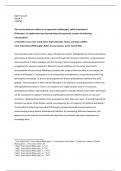Gigi Emanuels
Group 3
2788761
This course made you reflect on an approach in philosophy, called Intercultural
Philosophy. To explain what you learned about this approach, answer the following
sub-questions:
a. Describe in your own words what ‘interculturality’ means, and how it differs
from ‘Intercultural Philosophy’. Refer, in your answer, to the text of Mall.
Interculturality refers to the state or state of being intercultural, highlighting the interconnectedness
and reciprocal influence among various cultures through their dynamic interaction, comprehension,
and coexistence. It fosters dialogue and the sharing of ideas among diverse cultural perspectives by
recognizing the variations present in different cultural traditions. On the other hand, Mall's
interpretation of Intercultural Philosophy broadens the scope of interculturality to encompass the
realm of philosophy. It represents a recent disciplinary development or a repositioning within the
philosophical landscape. 1 It aims to bring together the diverse philosophical traditions that exist
globally.2 One key aspect of Intercultural Philosophy is its emphasis on posing questions rather than
offering definitive answers. 3 There is no existence of a single absolute truth or an exclusive
philosophical tradition, asserting that various philosophies mutually influence each other and should
not be considered in isolation.4 Intercultural philosophy examines different points of view and
scrutinizes a philosophical tradition from a perspective other than one's own. 5 It extends beyond the
historical narratives of the Western world, encompassing the rich tapestry of traditions worldwide. 6
The benefits of embracing Intercultural Philosophy include enhanced communication and
understanding among diverse philosophical traditions. By considering different viewpoints, this
approach has the potential to facilitate the acquisition of a broader and more comprehensive
knowledge base.
1
Ram Adhar Mall, “Intercultural Philosophy: A Conceptual Clarification”, Confluence: Journal of World
Philosophies 1, (November 2014), 68.
2
Mall, "Intercultural Philosophy: A.” 68.
3
Mall, "Intercultural Philosophy: A.” 69.
4
Mall, "Intercultural Philosophy: A.” 70-71.
5
Mall, "Intercultural Philosophy: A.” 70-71.
6
Mall, "Intercultural Philosophy: A.” 70-71.
, b. Why are the concepts ‘dialogue’ and ‘polylogue’ (as introduced by Wimmer in
his text) important in Intercultural Philosophy, and what do they mean?
Franz Martin Wimmer highlights the significance of 'dialogue' as an endeavor to address issues like
justice and human rights without being confined by Western perspectives. This implies that
philosophers from regions historically marginalized are now actively participating in a worldwide
discourse.7 Wimmer on the other hand elucidates the concept of 'Polylogue' as a framework
grounded in theories that delineate effective approaches to addressing philosophical issues and
queries. This model recognizes the diversity inherent in various cultural traditions and ensures
equitable participation among cultures in dialogue. 8 Moreover, 'polylogue' addresses the cultural
dilemma inherent in intercultural philosophy, promoting discussions that avoid reducing one
tradition to a universal standard or negating cultural aspects altogether.9 This distinction is vital in
the context of diverse cultural backgrounds and traditions, where discussions often require
engagement with numerous perspectives. By encouraging a multiplicity of viewpoints and critiquing
Eurocentrism, these concepts foster a more inclusive approach to intercultural philosophical
discourse, challenging exclusive perspectives and promoting a globalized understanding of
philosophy.10
c. Why is African Philosophy already intercultural according to Mosima? Quote
from his text to support your answer.
Pius Mosima contends that African Philosophy is inherently intercultural due to its development in
critical engagement with Western philosophy, a process influenced by historical factors like
colonialism and decolonization. Mosima argues that African philosophy remains rooted in the
everyday experiences of people living in historical communities, striving to conceptualize and
understand the world amidst external threats. 11 Dismas Masolo, cited by Mosima, emphasizes the
interconnected history of African philosophy with Western discourses on Africa and African
7 Franz Martin Wimmer, “Intercultural Philosophy – Problems and Perspectives,” (Vienna: University of Vienna,
2012), 121-122.
8 Franz Martin Wimmer, “Intercultural Philosophy – Problems and Perspectives,” (Vienna: University of Vienna,
2012), 122.
9 Franz Martin Wimmer, “Intercultural Philosophy – Problems and Perspectives”, (Vienna: University of Vienna,
2012), 122.
10
Pius, Mosima, "African Philosophy as Dialogue in Global Times: Towards an Intercultural Understanding of
African Philosophy," Filosofie & Praktijk 43, no. 3 (2022): 21.
11 Pius, Mosima, "African Philosophy as Dialogue in Global Times: Towards an Intercultural Understanding of
African Philosophy," Filosofie & Praktijk 43, no. 3 (2022): 26.





